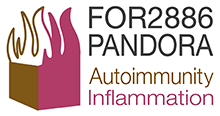Better understanding of chronic inflammation
Study creates basis for new forms of therapy for chronic inflammatory diseases
Although inflammations normally subside on their own, they can recur under certain circumstances and subsequently develop into chronic inflammatory diseases. A team from Erlangen University Hospital and Friedrich Alexander University Erlangen-Nuremberg (FAU) has discovered why this is so.
The term “tissue priming” describes the change in tissue to the effect that an inflammation preferentially recurs at the same location. Using the example of inflammatory joint diseases, the international research team from Erlangen, Birmingham, Zurich, Vienna, Cardiff, Belgrade, Lübeck and Münster shows that cells located in the tissue, so-called fibroblasts, are responsible for the inflammatory tissue priming. Repeated inflammatory stimuli gradually reprogram the fibroblasts into an aggressive state. These reprogrammed fibroblasts cause further inflammatory stimuli to trigger an increased and prolonged inflammatory response.
The study creates a basis for new therapies for chronic inflammatory diseases such as arthritis. Although drugs effectively suppress acute inflammation, it usually recurs when the drugs are discontinued. The research team now presumes that inflammatory tissue priming is the cause. However, because continued use of anti-inflammatory drugs is associated with side effects, the team is looking for alternative therapeutic methods. One approach is to try to reset the firoblast metabolism, which has been altered after initial inflammation, to its normal state and thus minimize the likelihood of renewed inflammation.
Original publication in Immunity
source: uni | mediendienst | forschung Nr. 29/2021
further information:
Dr. Markus Hoffmann
Telefon: 09131 85-43024
E-Mail: markus.hoffmann@uk-erlangen.de
